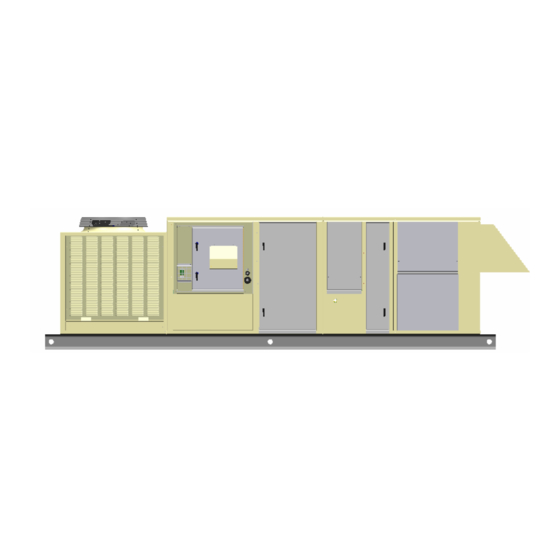Addison DF Series Руководство по установке, эксплуатации и техническому обслуживанию - Страница 12
Просмотреть онлайн или скачать pdf Руководство по установке, эксплуатации и техническому обслуживанию для Кондиционер Addison DF Series. Addison DF Series 19 страниц. High efficiency packaged air conditioning systems

ENERGY CONSERVATION WHEEL
Before starting up the unit, check the following:
1. Does the rotor rotate freely by hand?
If not, recheck the seal to determine whether or not it is
binding and if so adjust seals following the instructions
below.
2. Is the motor rotation correct?
This can be checked by detaching the belts from the drive
sheave and bumping the motor. The sheave should be
rotating in the direction such that the belt will result in
rotation per the exterior markings. If not, rewire the motor.
3.Does the air flow orientation match up to design?
See the identification markings on the cassette and/or
refer to the general arrangement drawing to check the four
duct connections to the unit.
4. Are the belts on correctly and sufficiently tight?
Belt length is set by the manufacturer. Consult NovelAire if
the belt appears too loose.
5. Is the VFD programmed to control the unit and to
prevent frost formation?
If not, follow the instructions in the manual accompanying
the VFD and/or consult NovelAire.
Seal checks
The ECW is provided with a neoprene bulb seal which
provides not only an effective seal in both the peripheral
and side-to-side sealing directions but also one which is
easily adjusted to compensate for seal run-in, shipping
misalignment, etc. The neoprene bulb is
attached to a metal reinforced U-shaped neoprene grip.
The metal/neoprene grip allows for an expandable grip
range which can be moved closer or further from the
sealing face as needed. The peripheral bulb seals against
the wheel outer band and the inner bulb seals against the
wheel face. With the wheel stopped, move seals as close
to the sealing surface as possible but without exceeding
grip range of bulb seal and without pressing the bulb
down against the seal face. Bump the motor. If the motor
will not turn, the seal is too close and should be nudged
back where needed. The seal will seek its equilibrium
position based on the closest part of the sealing face.
Because the seal is meant to be a non-contact seal, small
gaps may be seen between seal and sealing surface once
the equilibrium position is reached. Seal leakage is meant
to be less than 5% at 1 inch of differential between supply
and exhaust. Some seal run-in is to be expected, so don't
be alarmed by small amounts of wear in the neoprene.
Variable speed drive (VFD)
Check the power supply for proper rating. Make sure that
the proper jumper orientation is used for the specific
control input. Make sure that the unit is programmed for
proper input voltage and output voltage.
Maintenance
Bearings
Small ECW's, (smaller than ECW666) are provided with no
maintenance inboard bearings. These bearings should
require no maintenance during the life of the equipment.
Larger ECW's come equipped with an external flanged
bearing which should be greased annually. Use a
petroleum based lubricant.
Drive Motor
The drive motors should require no maintenance.
Replacement motors may be purchased from normal
motor distributors such as Grainger, or directly from
NovelAire if preferred.
Drive Belts
NovelAire ECW belts are multilink belts with individual
links constructed of a high performance polyurethane
elastomer reinforced with multiple plies of polyester fabric.
This belt provides a strong, yet flexible, belting. The
multilink feature provides quick, easy servicing or
replacement. See the Appendix for belt repair/replacement
instructions.
Seals
The seals are designed to be durable and require no
maintenance other than adjustment, but if seals become
worn or damaged they may easily be replaced. The seals
are made to clip on the cassette or post metal easily. Call
NovelAire for servicing information.
Wheel
The wheel is designed to last the life of the equipment. It
should be protected by an ASHRAE 30% filter to keep dust
and dirt from the heat transfer surface. The wheel is
somewhat self cleaning through its normal action of
rotating in and out of countercurrent air flow streams. If the
wheel becomes dirty, it may be cleaned by blowing out the
unit with compressed air (20 psig maximum). In cases of
severe filthiness, the wheel may be removed from the
cassette and washed with water following wheel
removable procedures outlined below:
1. Remove air handler plenum sections so that the front or
back of the cassette may be easily accessed and cleared.
2. Support the wheel from the bottom.
3. If the unit is equipped with an external flanged bearing,
loosen the Allen screws in the bearing housing that keeps
the shaft affixed in the horizontal plane of both bearing,
front and back. Remove the shaft clips at the face of the
hub from both sides of the shaft. Unbolt one post
completely and remove post with bearing completely out.
Remove the shaft. Roll the wheel carefully out.
4. If the unit is equipped with an internal bearing, unbolt
the shaft screw on both sides of the shaft. Unbolt one post
completely and remove post. Remove the shaft clips at the
face of the hub from both sides of the shaft. Remove the
shaft. Roll the wheel out carefully
5. With the wheel out, wash the media carefully with water.
Once clean, allow the media to dry out for several hours or
days if necessary.
6. Reinstall using the reverse procedure. Run the unit. It
may take several hours for the desiccant to dry out and for
the wheel to perform normally.
11
